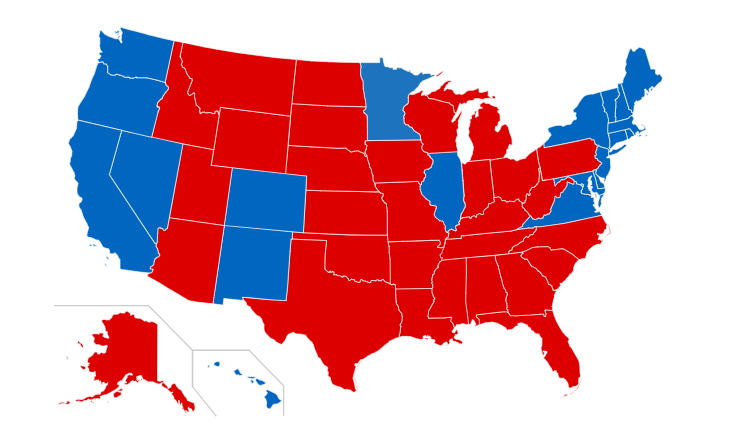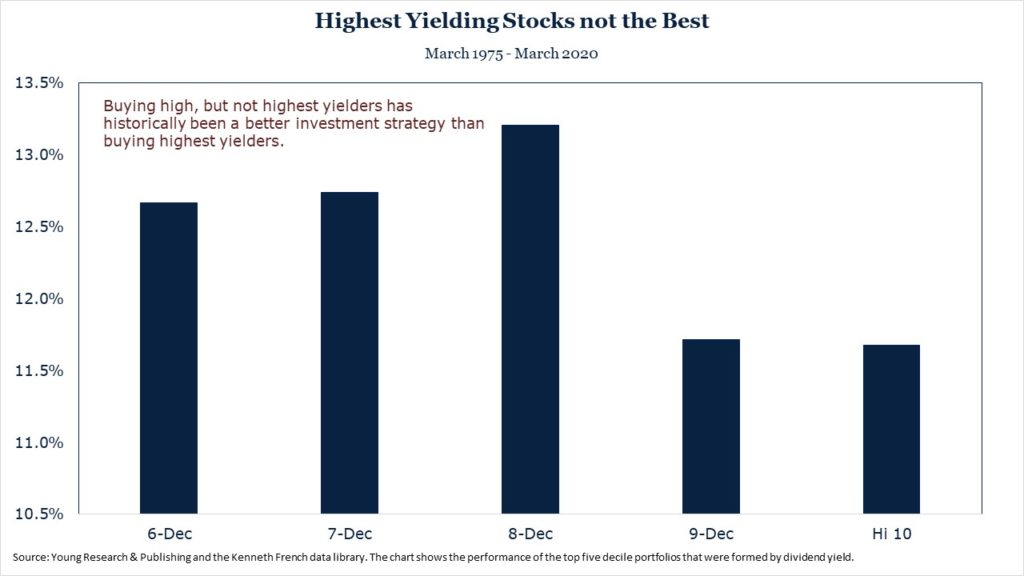Dear Survivor,
Your Survival Guy was recently asked how I would protect my family if a gang showed up at my door (answer below), which leads me to wonder: Where you live may never be more important.
Elon Musk has had it with California. Put me in jail, he says, but don’t think I’m letting my business die without a fight.
How hard would it be for you to move to a Red state? I’m not saying you do it now, but in prep for the next unforeseen event you might want to think about it.
Would being in a Red state improve your situation? We might find out, as guys like Musk take Blue states to task in court. Great. Let other people’s money show you the way.
Look at the pension debt of the big bad Blue states. There’s no doubt in my mind they’ll use this virus as an excuse for their fiscal malfeasance.
When they assume the federal government will bail them out, what does that make you and me? Ass-ets to be taxed. Speaking of taxes, you realize Amazon pays next to nothing, right?
Amazon employs 800,000 give or take. This virus has wiped out 30 million-plus jobs. That’s nearly 40 Amazons based on employees. Many of those jobs are never coming back because of companies like Amazon.
What will the fall look like if schools are closed? What if they open? How will first graders deal with wearing face masks at recess?
How about the parent who can’t let little Johnny out of the house without a panic pre-virus? Will schools follow the demands of the squeaky, fearful parent? A friend of mine with two grade-schoolers is considering a gap year for his family’s sanity.
Amazon CEO Jeff Bezos considers his many businesses as flywheels: when they’re really humming, they work on their own economy. Now we have governors gone wild, who can jam their foot in the economy and shut the whole thing down.
In Newport, R.I., the governor works the reception desks. Hotels are up in arms because out-of-state guests need to quarantine for two weeks. That flywheel is busted.
If Musk ramps up production of Teslas, who will buy them?
As for your Survival Guy’s home protection plan? “I’d suggest that vacant Airbnb down the street.”
Update! May 2020: Why Vanguard is Too Big for YOU
A new client of mine is consolidating his eight-figure fortune with Fidelity. What’s shocking is how easily he decided to leave Vanguard.
“Why?” I asked him.
“E.J., I haven’t heard from anyone at Vanguard in over a year,” he said.
“They’re letting a quarter of a hundred million dollars walk out the door,” I thought to myself. “The front door.”
That is shocking.
“I’ve read your father-in-law Dick Young for over 30-years,” he said. “I miss him.”
“Welcome home,” I said.
When the late Vanguard founder Jack Bogle released Bogle on Mutual Funds, Dick Young wrote the forward:
“Congratulations! You have made one of the wisest investment decisions of your life… Jack Bogle’s basic premise is the model of simplicity and integrity: Give investors clearly defined investment products at the right price.”
The rest is history.
Vanguard exploded.
Then things changed.
Vanguard became too big.
“There no longer can be any doubt that the creation of the first index mutual fund was the most successful innovation—especially for investors—in modern financial history,” Bogle said in 2018 only months before his passing. “The question we need to ask ourselves now is: What happens if it becomes too successful for its own good?”
“Who is talking with the customers?” he may have wondered.
Who is penalized when the only choice for a Vanguard advisory service is from a narrow offering of Vanguard only funds like the Vanguard 500 Index?
Does the phone rep, fresh out of college, even understand what market cap means? Do they know how to calculate it?
The Vanguard 500 Index is market-cap-weighted, meaning the largest companies by market cap (shares outstanding times price) have the most impact on its direction.
Only ten companies, or two percent, account for a quarter of the performance for the fund. Imagine a pie with four pieces: Ten companies account for one piece and 490 the other three. Talk about income inequality.
Makes you want to yell at someone.
Good luck getting through to a live voice.
Investing is emotional. I get it.
The basic calculation of the components comprising the core of the Index 500 Index is e-m-o-t-i-o-n. We know how many shares are outstanding when calculating market cap, but isn’t the price of anything a guess at best?
To understand the guesswork involved with market cap, take a look at Canada’s Shopify.
The e-commerce platform, founded in 2004, sells stuff like snowboarding gear, has 5,000 employees, posted a billion and a half in sales in its most recent fiscal year, and has zero profits. Compare Shopify to Royal Bank of Canada. Incorporated in 1869, RBC employs over eighty thousand and booked $12 billion in profits on $46-billion of revenue.
Earlier this month Shopify traded at a higher market cap than RBC.
Why expose your hard-earned money to emotions? Like you need more to worry about, right?
Why not seek out companies that pay you to invest in them? Take a look at how measuring a company by its dividends—the cash it actually pays out to you the shareholder—can help you.
Don’t speculate that higher stock prices or market cap will make you rich.
Let me remind you, the two-percenters are busy catering to the one-percenters, leaving a precious few crumbs to spread around.
| Company | Symbol | Weight | Yield |
| Microsoft Corporation | MSFT | 5.88% | 1.1% |
| Apple Inc. | AAPL | 5.41% | 1.1% |
| Amazon.com Inc. | AMZN | 4.22% | 0.0% |
| Facebook Inc. Class A | FB | 2.13% | 0.0% |
| Alphabet Inc. Class A | GOOG | 1.73% | 0.0% |
| Johnson & Johnson | JNJ | 1.67% | 2.7% |
| Berkshire Hathaway Inc. Class B | BRK.B | 1.39% | 0.0% |
| Visa Inc. Class A | V | 1.32% | 0.7% |
| Procter & Gamble Company | PG | 1.20% | 2.8% |
| UnitedHealth Group Incorporated | UNH | 1.16% | 1.5% |
Remember, my favorite investment in the world is in you. Your business, your skills.
It’s your work that can make you rich.
Investing well is how you keep it.
And it’s not inherent knowledge what I’m telling you.
It’s something you need to be continually reminded of.
To keep you on course.
American Businesses Show the Way Forward Where Blue-State Politicians Fail
During the coronavirus outbreak, the difference between heavy-handed local government, and private enterprises has been plain.
Businesses are incentivized to protect their most important assets, their employees. Government officials are protecting their own reputations.
In the early days of the virus, Leupold, an American business serving police departments and America’s military elite took smart steps to protect employees.
At The Federalist, Madeline Osburn reports on Leupold’s response in an interview with company CEO Bruce Pettet. Describing the response, Pettet told Osburn:
Because we have Department of Defense contracts, so we knew that we were in an essential business so I was never worried about someone telling us we can’t operate. We actually got some urging from the Department of Defense and their purchasing department telling us we had to keep manufacturing because of some of our contracts.
We had to make some changes to our factory layout, which was challenging. We made the decision to actually close our factory and do a complete deep clean of all the offices, factory, everything. Then our engineering team and factory team came in and said, “Where are the places where we’re working tight?” Right, you have that when you have 600 people. So we reengineered our factory, particularly assembly, to make sure that they have the proper social distance and to make sure we’re following the guidelines that have been laid out.
We made sure that we reengineered so that the priority products for our military and for our law enforcement, that those were the priority. So it did take away a little production from what would be our normal commercial sales, but we actually upped our production on some products like our DeltaPoint Pro Reflex sight, which which a number of our military law enforcement users use.
Our average employee has been with us for 12 years. I’ve got some that have been here for over 40. I think I’ve got 12 over 14 years. When you have the kind of tenure that we have, it is kind of like a family. Everyone wanted to roll up their sleeves and get this thing done. I was pretty impressed and I’m just blessed to have a team that is willing to get after do what they did.
The ability to take intelligent steps to keep employees healthy and remain in business are what make American industrialists the best in the world. Meanwhile, in blue states and cities where governors have gone wild, things haven’t gone so well.
One of those governors is New York’s Andrew Cuomo. The Blaze reports on the field hospitals New York built. Now the governor and fellow-traveler NYC Mayor Bill de Blasio want taxpayers from across the country to pay for them. The kicker is, most of the hospitals were barely used, some not at all. Chris Enloe writes:
A field hospital set up in Brooklyn specifically for coronavirus patients is now being dismantled without having served a single patient, The City reported.
As New York City quickly became the global COVID-19 epicenter, city officials ordered that many sites across the city be converted into field hospitals. At the time, experts said the growing pandemic would easily overwhelm the city’s hospital system.
One such site transformed into a hospital was the Brooklyn Cruise Terminal in Red Hook, which was designed to treat nearly 700 patients.
According to The City, the field hospital was “slated to open in mid-April but wasn’t ready for service until May 4.” But by the time construction was completed, New York’s coronavirus-related hospital population had dropped significantly, meaning the city no longer needed the field hospital.
And now, the site is being demolished.
What’s worse, city officials reportedly expect the Federal Emergency Management Agency — via the taxpayer — to pick up the $20.8 million tab for constructing and tearing down the temporary site.
Joel Kotkin and Wendell Cox offer solutions on the way forward for big cities and America, writing at The American Mind:
To survive, cities need to focus on reducing exposure density, which the public may also support. Right now, according to the Harris Poll, as many as two in five urban residents, including the young, are considering a move to a less dense place. The latest consumer survey from the National Association of Realtors found consumers are “looking for larger homes, bigger yards, access to the outdoors and more separation from neighbors.”
The cities of the future will no doubt retain “hip”, dense creative districts, but tech and high-end business services have been moving during the past five years to sprawling, low-density metro areas like Austin, Nashville, Orlando, Charlotte, Salt Lake City, and Raleigh. For many cities, it might make sense to give incentives not for office towers but for home-based workers; most people now working from home—some 60% according to Gallup—express a preference to continue doing so for the foreseeable future.
For the rest of the population, the last thing we need is another economic collapse as deep as a depression, which, even if it is short, will produce millions of “losers” who will never recover their lives. Rather than adhere to the ideological visions of planners and pundits, we need to move in bold ways to minimize potential exposure to this and future pandemics.
This should largely be led by the marketplace and through innovation. Consumers will demand new alternatives to transit, going beyond telecommuting to autonomous cars and cabs, which could provide mobility in the niche areas where transit dependence is high. Consumer demand could lead to changes in housing design, for example, such as developing houses with separate entrances and dedicated workspaces.
Faced with a crisis in urban forms, the biggest danger would be to do nothing, or even double down on the very things that worsened the pandemic. Density, transit, and poverty present special challenges in the pandemic era. Finding ways to address them should be our highest priority for the future.
Survive and Thrive this Month.
Warm regards,
E.J.,
“Your Survival Guy”
- If someone forwarded this to you, and you want to learn more about Your Survival Guy, read about me here.
- If you would like to contact me and receive a response, please email me at ejsmith@yoursurvivalguy.com.
- Would you like to receive an email alert letting you know when Survive and Thrive is published each month? You can subscribe to my free email here.
- You can also follow me on Twitter, Instagram, and Facebook.
P.S. Do Governors Have the Right to Make and Enforce Laws? You might want to take a few minutes to contemplate your rights. How can governors go wild without checks and balances? There’s a reason states are governed by three branches, not one governor wielding a big stick.
Has there ever been a more important time to consider the balance of power in your state?
Andrew Napolitano writes:
The current interferences with the exercise of rights protected by the Bill of Rights devolve around travel, assembly, interstate commercial activities and the exercise of religious beliefs. These infringements have all come from state governors who claim the power to do so, and they raise three profound constitutional issues.
The first is: Do governors have inherent power in an emergency to craft regulations that carry the force of law? The answer is no. The Guarantee Clause of the Constitution mandates a republican (lowercase “r”) form of government in the states. That means the separation of powers into three branches, each with a distinct function that cannot constitutionally be performed by either of the other two. Since only a representative legislature can write laws that carry criminal penalties and incur the use of force, the governor of a state cannot constitutionally write laws.
The second constitutional issue is: Can state legislatures delegate away to governors their law-making powers? Again, the answer is no because the separation of powers prevents one branch of government from ceding to another branch its core powers. The separation was crafted not to preserve the integrity of each branch but to assure the preservation of personal liberty by preventing the accumulation of too much power in any one branch.
We are not talking about a state legislature delegating to a board of medical examiners in the executive branch the power to license physicians. We are talking about delegating away a core power — the authority to create crimes and craft punishments. Such a delegation would be an egregious violation of the Guarantee Clause.

Click here to visit Richardcyoung.com’s Liberty & Freedom map. There you can see how your state’s tax picture compares to all the others’.
P.P.S. Governors have gone wild to protect the rich. You’re seeing up close how blue state governors love states’ rights only when they’re in charge and what a mess it creates when different rules apply across state lines.
Take a look at Rhode Island and Massachusetts, for example. Rhode Island has shelter in place until next Monday, May 9, while in Massachusetts the end date is May 18. Yet, Rhode Island is more strict, prohibiting groups larger than five while Massachusetts allows ten.
My parents and my sister’s family live in Massachusetts. When we gather, we make a group of ten. That’s against the rules in RI, but not if we go to Massachusetts. Talk about crazy.
New England weather has been cold and wet during this lockdown. You can imagine what it was like this weekend when temps hit season-highs and the sun was shining. You could hear the Harley Davidson’s roaring up Memorial Blvd.
But no stopping at the beach.
The parking lot is closed. Big orange barrels line the street with nowhere to park. Unless you live in Newport and walk to the beach, you can’t use it without some serious effort.
Who does this protect?
It’s the same situation at the more remote Second Beach in neighboring Middletown, RI. The parking lot is protected by a fresh installment of Jersey Barriers. Unless you live in one of the 7,000+ square foot mansions perched on the cliff overlooking the beach, you have nowhere to park.
Who does this protect?
The Park City, UT paper writes about hiking trails being open to the public, but the parking lots are closed. Fine if you live near the trailhead, but what about those stuck in multi-story apartments in Salt Lake?
Who does this protect?
The same in California. Beaches are closed. Nowhere to park. Own a waterfront home? Fine. Have a backyard with a pool? Fine.
Who does this protect?
When blue state governors go wild, it penalizes those it claims to protect.
P.P.P.S. Wondering where to live in retirement? I got you covered baby!
You worry about where you live in retirement. I get it. You hate the idea of leaving your kids behind. I’m here to tell you: Don’t despair, they’ll visit!
But if social distancing is your concern, consider snowy Maine or New Hampshire in January. You might see a bear or two, but they’ll be back asleep before you know it. You’re going to love your new-found freedom.
Thumbing through my 2020 copy of the Traveler’s Guide to the Firearm Laws of the Fifty States, Maine stands up strong. Want to drive a gun to your home? Fine. Just be sure to leave from New Hampshire or Vermont.
Stay away from gun-hell Massachusetts, Connecticut and to a lesser degree Rhode Island.
In New Hampshire, you can live free or die, baby. You have constitutionally protected rights to carry a concealed handgun without a permit. In nanny state Connecticut, a handgun left in an unattended vehicle must be in a “locked” compartment, or else! (my words).
I like Utah’s strong self-defense “no duty to retreat” statute. Same for Florida (remember your kids will visit), but I have concerns about its “stand your ground” law holding up in court. Better to not let the courts decide your future.
South Carolina? Love it (again the kids may visit to play golf), especially when it’s snowing in New England in May. Just sayin’. South Carolina is open for business. It has a right to work, pro-business stance, and is welcoming First Solar to its stable of businesses.
Rhode Island’s governor is excited to announce summer camps will open in late June, if everyone behaves. Yippee! But no more than ten kids per pod. And sorry, the Fourth of July fireworks are postponed. No fun for you!
The governors gone wild would be wise to fall in behind the leadership of President Trump. While supplies were left barren by the likes of Obama and Cuomo, Trump is leading the charge to overhaul our medical stockpile. The WSJ reports: “When the new coronavirus first began to spread in the U.S., the Strategic National Stockpile contained one to three weeks of most equipment and didn’t carry several supplies that have proved critical in combating the virus, including critical-care drugs and testing equipment, the officials said.”
RIP Jerry Stiller aka Frank Costanza
P.P.P.P.S. Steve Schneider wrote recently:
The U.S. Air Force has reached out to the weapons industry regarding a hypersonic cruise missile that can be launched from a fighter jet or bomber. The service is aiming to conduct a preliminary design review by 4th quarter 2021. The future program could leverage work already done by the Department of Defense (DoD) and the Air Force Research Laboratory on the Hypersonic Conventional Strike Weapon to help speed the way for rapid prototyping. Read more from Valerie Insinna of DefenseNews:
WASHINGTON — The U.S. Air Force is seeking information from industry about hypersonic cruise missile technology, with the hopes of starting up a new prototyping program in the near future.
The service issued a sources sought notification on April 27 asking companies to submit information about air-breathing conventional hypersonic cruise missiles that could be launched from fighter jets and bombers.
The responses will help the Air Force determine whether to begin funding a new program of record and figure out how quickly it will be able to field the new weapon, said Air Force acquisition executive Will Roper.
“In the case of how fast we could go with the scramjet technology getting into cruise missile and missionizing it, I think we can go fast,” he told reporters April 30. “I don’t know how fast — that’s why we’re reaching out to the street. But given how far scramjet technology has matured, I’d expect that we’ll be able to go pretty quickly on this.” […]
[…] Roper said the hypersonic cruise missile effort would involve inputs from the Air Force Research Laboratory and the Defense Advanced Research Projects Agency.
In particular, DARPA’s Hypersonic Air-breathing Weapon Concept, or HAWC, effort could inform the new program. As part of the effort, a Raytheon-Northrop Grumman team and a Lockheed Martin-Aerojet Rocketdyne team are building scramjet-powered hypersonic vehicles.
Download this post as a PDF by clicking here.
E.J. Smith - Your Survival Guy
Latest posts by E.J. Smith - Your Survival Guy (see all)
- Rule #1: Don’t Lose Money - April 26, 2024
- How Investing in AI Speaks Volumes about You - April 26, 2024
- Microsoft Earnings Jump on AI - April 26, 2024
- Your Survival Guy Breaks Down Boxes, Do You? - April 25, 2024
- Oracle’s Vision for the Future—Larry Ellison Keynote - April 25, 2024



















